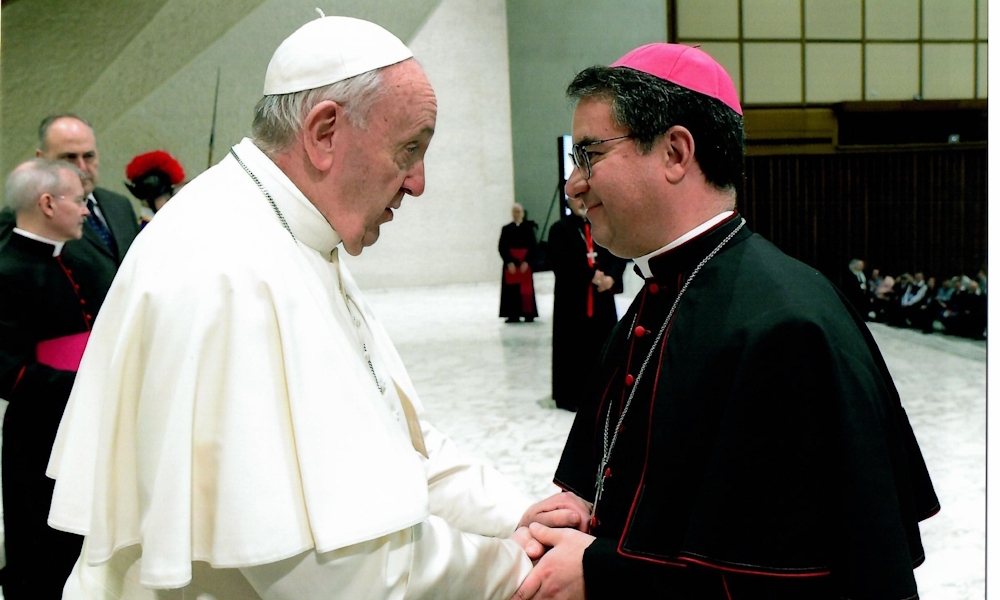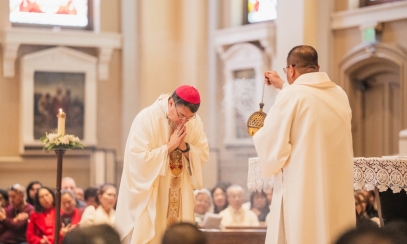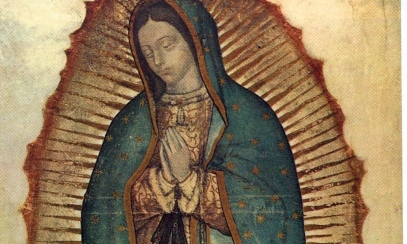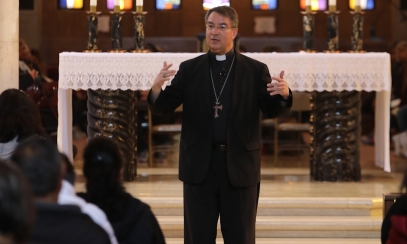
The Gospel of Joy and Mission
Honoring the Pontiff Who Built Bridges
Honoring the Pontiff Who Built Bridges
Homily by Bishop Oscar Cantú at the Diocese of San José Memorial Mass for Pope Francis at Cathedral Basilica of St. Joseph on April 29, 2025. The original homily was edited for length and style.
Homily by Bishop Oscar Cantú at the Diocese of San José Memorial Mass for Pope Francis at Cathedral Basilica of St. Joseph on April 29, 2025. The original homily was edited for length and style.
It was just weeks into the pandemic when Pope Francis walked in the pouring rain up St Peter’s Square all by himself that Sunday afternoon to pray for the world. St Peter’s Square, usually teeming with tens of thousands of people, held not a soul — only this elderly Argentinian man dressed in white, walking slowly, with a limp. The entire world, Catholic or not, Christian or not, was glued to the screen, because everyone felt the need for an intercessor, someone to pray for us, someone to pray for the world. And he did. He prayed before that miraculous crucifix and spent time in prayer before the Blessed Sacrament, interceding for the world.
That is what the pope does. He prays. He intercedes before God on behalf of the world. One of his titles, pontiff, refers to the pope’s role as a bridge between humanity and God, a bridge between members of the human family. Pope Francis was building bridges that day: bridges of prayer, bridges of faith, bridges of humanity.
The Smile of the Gospel
I do not know if you ever saw pictures of Pope Francis when he was archbishop of Buenos Aires, but I rarely saw a picture of him smiling. As pope, I rarely saw a picture of him not smiling. He knew that he needed to change, that the world needed a message of hope: the Gospel that forms our life, of the Christ who transforms our life, is an encounter of joy. He needed not only to write about it and to speak about it; he needed to show us in his very example. And he did.
Going to the Margins
He brought the focus of the world to those who live on the margins of society. He alerted us all to the “globalization of indifference.” Perhaps when we reflect on the myriad of troubles across the globe, it becomes too much for us: we say, I don’t have the time, I don’t have the energy to care—and we move on. Pope Francis taught us to stop and ponder this reality.
Caring for Our Common Home
He called on every one of us — not just the Church, not just politicians — to care for the common home God has given to us. As a matter of fact, that was the first mandate God gave to humanity: till the earth; take care of it. He reminded us that care for the Earth is often connected to care for those on the margins, because environmental degradation first and foremost affects the poor, causing them to migrate and to lose their livelihoods.
From the Heart of Christ: Devotion and Mission
A much lesser-known document Pope Francis left the world just a few months ago is Dilexit nos, “He loved us,” in which he promotes devotion to the Sacred Heart of Jesus.
Toward the end of Dilexit nos, Pope Francis reminds us that love must be connected to mission. In today’s Gospel, Jesus asks Peter, “Do you love me? … Feed my sheep.” (John 21:1517) Mission, Pope Francis says, “as a radiation of the love of the heart of Christ, requires missionaries who are themselves in love and who, enthralled by Christ, feel bound to share this love that has changed their lives” (n. 209).
Peter’s life was completely transformed; it was turned upside down. He had to leave his boat and his nets behind, and even his family. He misunderstood Jesus many times and often put his foot in his mouth, but at the end of the day, his life was transformed.
Pope Francis quotes Dante Alighieri to express the logic of this love: “I declare that in thinking of its worth, love so sweet makes me feel that, if my courage did not fail me, I would speak out and make everyone else fall in love.”
Fall in love! That is what Peter did: he fell in love with Love itself. Jesus not only called Peter, but Jesus also called Pope Francis, and Jesus calls you and me.
Pope Francis continues: “Jesus has called you and is sending you forth to spread goodness in our world. His call is one of service, a summons to do good, perhaps as a physician, a mother, a teacher. Wherever you may be, you can hear this call and realize that He is sending you forth to carry out that mission. He Himself told us: ‘I am sending you out’” (n. 215). Participating in the mission of the Church is an extension of our loving friendship with Christ.
“Do You Love Me?”— Our Call Today
Pope Francis clearly connects Dilexit nos to his social encyclicals. “The present document helps us to see that the teaching of social encyclicals: Laudato Si’ on the environment and Fratelli tutti on social friendship, is not unrelated to our encounter with the love of Jesus Christ, for it is by drinking from that same love that we become capable of forging bonds of fraternity, of recognizing the dignity of each human being, and of working together for our common home” (n. 217).
Peter, do you love me? Francis, do you love me? Oscar, do you love me? And you? Do you love me?
Brothers and sisters, Pope Francis calls us not simply to admire him and his work, but to allow the heart of Christ to transform our lives and to extend that love to humanity.



